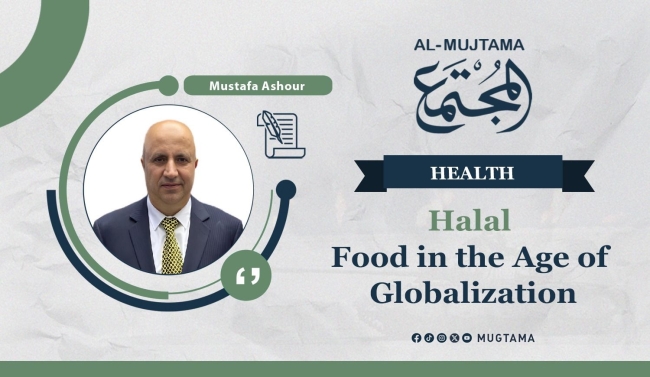The slogan "Halal" has deeply penetrated global food markets. It's rare to find a major food market anywhere in the world without the word "Halal" displayed on a sign, restaurant, or product packaging. This slogan embodies significant meanings, primarily the religious perspective on food and the jurisprudential rulings regarding certain foods. It also serves as an introduction to Islam for many non-Muslims and creates shared spaces for interaction between Muslims and others. Moreover, "Halal" foods have become a health and ethical preference for a significant portion of the global population, representing a symbol of ethical and healthy food consumption.
The Zionist writer Melanie Phillips, in her book Londonistan published 18 years ago, noted the positive interaction fostered by halal food between Muslims and others. However, she warned that halal food is merely the beginning of imposing a separate Islamic identity and subsequently Islamic law, which does not recognize the state. She suggested that this allows the Muslim minority to impose its values on British society, seemingly to support the campaign of fear against Islam.
A Promising Global Market
Human daily activity is closely tied to seeking food, consuming significant effort, expenses, and health resources. Consequently, religion has regulated this relationship. Islam introduced the concept of wholesome food, emphasizing that food must be from lawful sources and inherently good and beneficial. Hence, food-related rulings occupy a considerable space in Islamic jurisprudence.
In the era of globalization, statistics indicate that the average spending on food accounts for 40% of income in low-income economies, 22% in middle-income economies, and 10% in high-income economies. This underscores how food acts as a medium for cultural, civilizational, and religious interaction.
In 2023, the halal food market reached approximately $2.3 trillion (specifically $2,339.1 billion), growing at an annual rate of around 10%. By 2030, it is expected to reach $5.2 trillion. Halal consumers exhibit greater loyalty to halal-certified brands compared to the average consumer. They are also willing to pay extra for compliance with halal standards, making halal projects among the most profitable globally. Estimates suggest there are over two billion halal food consumers worldwide.
Interestingly, malls, considered hubs of globalization, have become key venues for marketing halal food to those seeking safe shopping. According to the United Nations, 56.9% of the global population lived in urban areas in 2022. This percentage rises to 79.9% in developed countries, compared to 52.3% in developing countries, making mall shopping predominant and driving the presentation of halal products there.
For over four decades, the "Halal" label has been prominently featured on global dining tables, with non-Muslim countries being the largest providers of halal food. Non-Muslim countries account for approximately 85% of the global halal product market, while Muslim countries contribute only 15%.
Given the increasing global demand for halal food, more than 36 halal certification bodies operate in over 18 countries. Halal food scarcity can even hinder tourism; for instance, a 2023 survey cited by Japan in Arabic revealed that 86% of respondents expressed concern over the lack of halal restaurants and stores.
Food and Health
According to the World Health Organization, unsafe food causes over 600 million cases of illness annually, resulting in more than 420,000 deaths. The organization estimates that unsafe food wastes over 33 million years of healthy life annually. Awareness of the strong link between food and public health has driven millions to seek food that meets stringent health and ethical standards, making halal food a preference even for non-Muslims.
In October 2022, the journal Food Bioscience published a field study by researchers from the University of Extremadura, Spain. The study compared the physical, chemical, and nutritional properties of halal and non-halal meats, focusing on beef and lamb. It analyzed the impact of their consumption on body composition, gut microbiota, and antioxidants. The findings highlighted the positive effects of halal meat on participants' weight, muscle mass, body fat, and antioxidant status without altering gut microbiota or biomarkers like glucose, insulin, or iron levels. This explains why halal meat counters attract both Muslims and non-Muslims alike. For example, in Britain, 70% of consumers prefer halal meat over conventional meat.
What distinguishes the halal meat market is that religious requirements extend beyond the slaughtering process to the animal's upbringing, emphasizing a diet of grass and beneficial, clean feed. Meat from animals raised on impure or harmful substances is considered detrimental. Islamic jurisprudence, particularly the Hanbali school, prohibits consuming meat from animals predominantly fed on impure substances, termed "jallalah" (a jurisprudential term for animals whose diet significantly impacts their flesh and milk). For non-Muslims, the halal label is often associated with organic meat, which adheres to strict standards of quality and cleanliness, starting from the animal's upbringing to its arrival on the consumer's table. This similarity has increased non-Muslim demand for halal meat.
Globalization has facilitated the establishment of major halal certification bodies, such as the World Halal Council (WHC), founded in 1999 to standardize halal certification processes. The council initiated the designation of Ramadan 17 as the "World Halal Day," commemorating the revelation of the verse: "So consume what you have taken of war booty [as being] lawful and good" (Al-Anfal: 69).
-------------------------------------------------------------
1. The Halal certification began in the West in the mid-1960s in the United States, initiated by Muslim food experts as a necessity for Muslims living in a non-Muslim society.
2. A shopping mall typically offers more than 40,000 items.
3. The ten largest exporters of Halal products are India, Brazil, Austria, the United States, Argentina, New Zealand, France, Thailand, the Philippines, and Singapore.
4. Malaysia, Indonesia, and Turkey are among the leading Muslim countries contributing to the Halal economy, with Turkey's exports exceeding $20 billion annually.
5. European laws mandate the stunning of animals before slaughter. In 2012, the European Union passed a law requiring countries to double the stunning level for poultry before slaughter, often using carbon dioxide gas, which usually results in the animal's death before slaughter.


